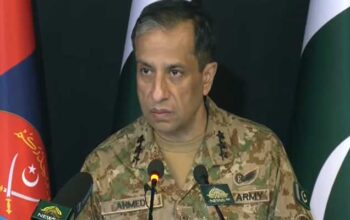By Staff Reporter
ISLAMABAD: Pakistan began a nationwide crackdown on Wednesday against thousands of illegal immigrants, mostly Afghans, who failed to leave the country by a government-imposed deadline that expired at midnight on Tuesday.
The country has started a mass deportation of undocumented Afghans amid rising tensions over security and refugee issues.
The authorities said they would round up and detain those who did not voluntarily return to their countries of origin or register with the government for legal status.
The deportation campaign, which has been criticized by human rights groups as inhumane and impractical, is part of Pakistan’s efforts to deal with the influx of millions of refugees and migrants who have crossed its borders over the past four decades, fleeing war and poverty in neighboring Afghanistan and other countries.
Pakistan hosts about four million Afghans, of whom 2.3 million are registered as refugees. Many of them have lived in Pakistan for generations, integrating into the society and economy. Many of them fled their country during the Soviet invasion in 1979 and the subsequent civil war and Taliban rule. The numbers increased after the Taliban regained power in Afghanistan in August 2021.
But Pakistan has repeatedly extended and then revoked their legal status, creating uncertainty and anxiety among the Afghan community. The latest deadline was set by the caretaker government that took over in August after the previous administration completed its term.
Interior Minister Sarfaraz Bugti said in a video message that the deportees would be held in detention centers for two to three days before being sent back to Afghanistan through the border of Pakistan’s choice.
“We will try to provide them with food and health facilities and after that we will deport them through the border of our choice which will be in keeping with our security [requirements] and convenience,” he said.
The government has set up at least 10 deportation centers across the country, mainly in the provinces of Balochistan, Khyber Pakhtunkhwa, and Sindh, where most of the Afghans reside.
“We have given clear instructions to all agencies and officials to treat women, children and elders with special care and respect,” the minister said, adding that arrangements for food and medical facilities were being made in the holding centers.
The government says it is only targeting those who are undocumented and pose a security threat, but many Afghans say they are being scapegoated for Pakistan’s domestic problems.
Pakistan has accused Afghans of involvement in suicide bombings, militant attacks, smuggling and other crimes, without providing evidence. It has also blamed them for straining its economy and social services.
But even as Bugti spoke, authorities in Islamabad razed settlements where Afghans lived, leaving them to sift through the rubble for their belongings.
More than 130,000 Afghans have voluntarily returned to their homeland since the government announced the crackdown on Oct. 3, according to the United Nations refugee agency.
Tuesday saw an uptick in the number of returning Afghans with a looming deadline and reports of harassment by some local officials and residents.
Many Afghans said they were leaving reluctantly, fearing insecurity and instability in their war-torn country. Some said they hoped to return to Pakistan someday if conditions improved.
Pakistan’s decision has drawn sharp criticism from human rights groups, who have called it a violation of international law and a humanitarian crisis.
Many humanitarian organizations have urged Pakistan to respect the rights and dignity of the immigrants and provide them with legal protection and assistance.
“Pakistan should not coerce or pressure Afghan refugees to leave the country against their will,” said Omar Waraich, deputy South Asia director at Amnesty International. “Instead of creating an atmosphere of fear and intimidation, Pakistan should work with the Afghan government and the U.N. to ensure that any returns are voluntary, safe and dignified.”
The deportation drive has also sparked criticism from Western countries and the United Nations, who have urged Pakistan to respect its international obligations and protect the rights of the vulnerable Afghans.
“Amnesty International strongly reiterates its call to the Government of Pakistan to immediately reverse its decision to forcibly deport unregistered Afghan refugees ahead of the deadline set for tomorrow,” the group said in a statement on Tuesday.
It added that Pakistan must abide by the principle of non-refoulement, which prohibits sending people back to a place where they face persecution or serious harm.
“Amnesty International is also calling on the international community to financially support Pakistan for hosting Afghan refugees, and to share the responsibility by increasing resettlement places for those most at risk,” it said.
Caretaker Prime Minister Anwaar-ul-Haq Kakar said on Tuesday that there was no permanent ban on the return of Afghans to Pakistan and that they could come back with proper visas and documents.
“We have not placed a perpetual ban on them that they cannot come back to Pakistan after today,” he told journalists. “They should go to their countries, get their travel documents issued from their states, get visas from our mission there. Whether they want to come for educational purposes, for business, whatever their purpose may be, we will facilitate that.”
Copyright © 2021 Independent Pakistan | All rights reserved




